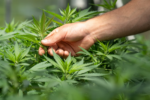
Massachusetts defers recreational marijuana delivery and onsite consumption, Arkansas approves five medical cannabis cultivators, and Washington state grants its floundering hemp program a reprieve.
Here’s a closer look at some notable developments in the marijuana industry over the past week.
An ‘elegant’ solution
The decision by Massachusetts regulators to delay licensing for stand-alone marijuana delivery services and onsite consumption businesses drew criticism from some cannabis proponents.
Specifically, critics said the Cannabis Control Commission (CCC) caved under pressure from opponents who wanted a delay.

“This is a very elegant way for the CCC to meet the demands of a lot of different groups,” said Shanel Lindsay, a member of the Cannabis Advisory Board, which advises the commission.
Industry diversity advocates like Lindsay view delivery and onsite consumption licenses as a way to bring minorities into the sector because those businesses are less expensive and don’t necessarily require investor backing.
That’s why such provisions were written into the recreational cannabis referendum that voters passed in 2016.
“When we were drafting Question 4,” Lindsay said of the adult-use measure, “we specifically drafted this law to correct the problem we saw on the medical side. … There were no small businesses or people of color involved.”
There was such a clamor from high-ranking state officials and groups like the Commonwealth Dispensary Association to defer delivery and onsite consumption licenses that diversity advocates worried the permits would be delayed indefinitely and unconditionally.
And that would have effectively shut an important door on minority participation in the industry.
But the commission reached a compromise under which it agreed to:
- Draft delivery and onsite consumption rules within one year.
- Create an initial time period when those licenses will go only to people affected by the war on drugs.
How long should that time period be?
“We think five years is reasonable,” Lindsay said. “The idea is to let these businesses get a foothold in the industry.”
Arkansas gets going
The medical marijuana market in Arkansas is gaining momentum after five companies were selected this week to grow cannabis for the program.
David Couch, a Little Rock attorney and MMJ proponent, sees the future success of the program as a matter of timing.
He’s hoping the Arkansas Medical Mariuana Commission will sync the opening of dispensaries with the growers’ harvest.
Couch is confident the five licensees will have the resources to start building combination greenhouse and warehouse facilities immediately.
The marijuana commission is expected to award 32 dispensary licenses near the end of May.
Couch estimates sales will begin around Labor Day.
“That’s about the soonest you could do it,” Couch said. “The worst thing we could do is open dispensaries and not have enough product.”
He’d like to avoid price gouging and a supply shortage, for instance.
Couch noted, however, that dispensaries are permitted to possess 50 mature plants, “so they’re not totally reliant on the growers.”
There should be plenty of MMJ customers once the dispensaries open.
According to Couch, the Department of Health has accepted about 5,000 applications from patients.
Registration cards have a one-year expiration date, so they won’t be issued until 30 days before the dispensaries open.
“They’re trying to do this in a sensible way so when (dispensaries) open, everybody will have their card, everybody will have product and everybody will be happy,” Couch said.
He expects to see a few more dispensaries and qualifying conditions added once the program is up and running.
A boost for hemp
Washington state’s endangered hemp program came off life support when state lawmakers proposed restoring money to oversee the fledgling industry.
But hemp advocates in Washington state say there’s a lot of work ahead to get the program back on track for 2018.
Cory Sharp, a Moses Lake hemp grower who wants to raise 500 acres of hemp this year, is helping plan three free seminars across the state to let farmers and Washington’s mature marijuana industry know about opportunities in hemp production.
The goal is to alleviate fears that Washington’s hemp program is going away.
The state had just seven hemp growers in 2017, the first year of Washington’s program.
“When they put the brakes on (the hemp program),” Sharp said, “it obviously cooled everybody’s enthusiasm” for growing the plant.
“We’ve seen a definite chill. Our job now is to re-energize everyone back up.”
The program’s future success could hinge on new rules that allow hemp producers to sell flower.
Flower is the most valuable part of the plant, but regulators didn’t allow it in Washington’s initial hemp season last year.
The change should spark Washington’s hemp industry to catch up with its mature marijuana market, Sharp said.
“We can catch up within a couple years,” said Sharp, CEO of HempLogic, which also offers hemp seed, processing and consulting services. “There’s a ton of interest in it.”
Omar Sacirbey can be reached at [email protected]
Bart Schaneman can be reached at [email protected]
Kristen Nichols can be reached at [email protected]



